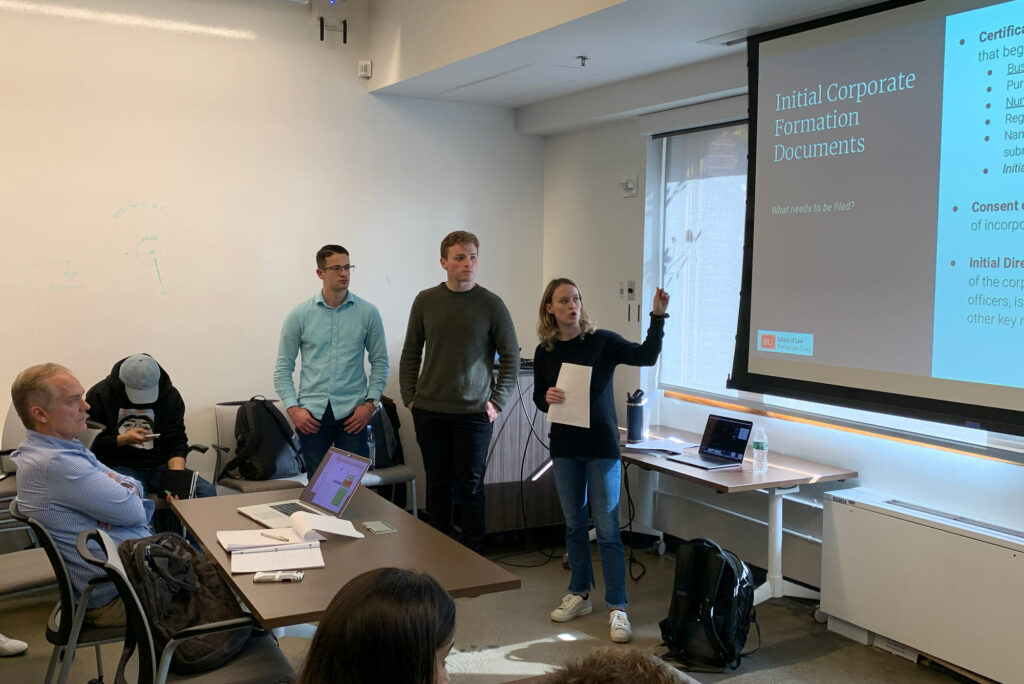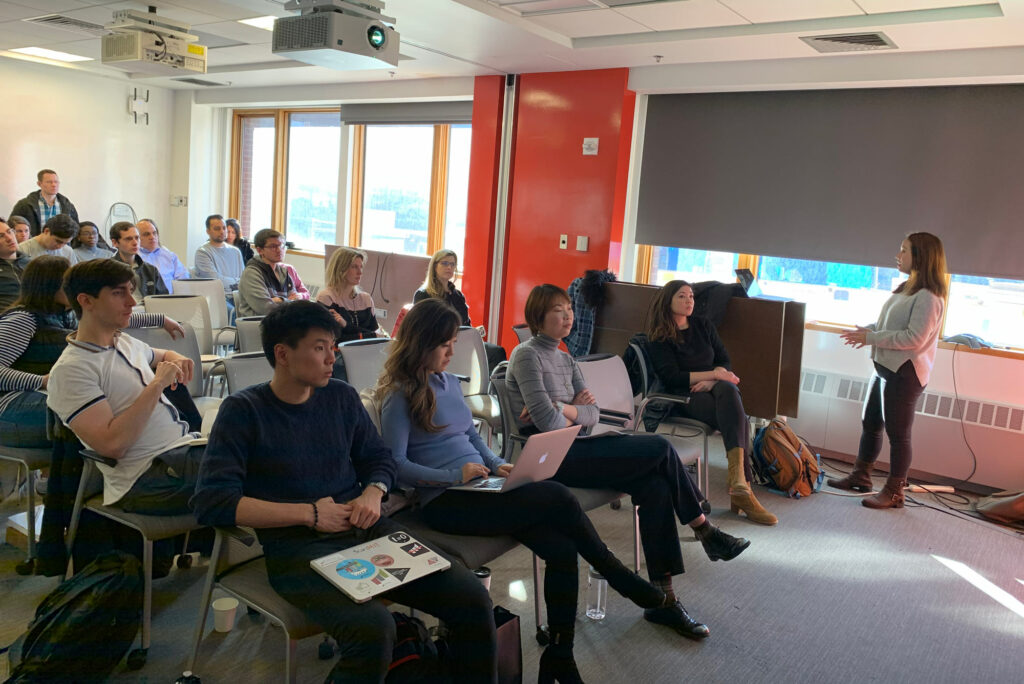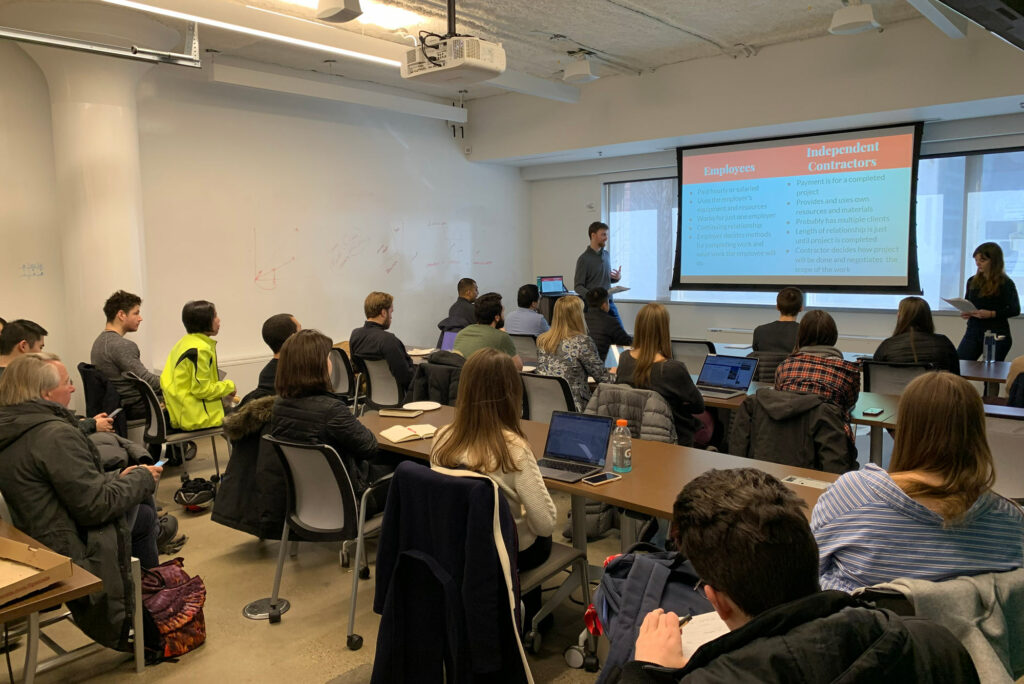So much has occurred because the first of two BU-MIT regulation clinics opened in 2015 to offer free authorized companies to MIT pupil innovators whereas giving BU College of Law college students expertise within the quickly increasing fields of know-how and startup regulation.
Greater than 750 MIT pupil groups have acquired help from LAW college students, who’ve offered them with roughly 50,000 hours of shopper work, accounting for properly over $10 million price of free authorized companies.
In a significant entrepreneurship competitors at MIT final 12 months, two-thirds of the finalists had benefited from the clinics’ help. On BU’s facet, 44 regulation college students labored within the clinics through the previous faculty 12 months and over the summer season, accounting for nearly one-sixth of the complete regulation class.
A variety of superior pc science analysis can look and really feel just like the type of ‘hacking’ that’s prohibited by legal guidelines just like the Pc Fraud and Abuse Act. So, usually we’re serving to purchasers keep on the opposite facet of hacking legal guidelines.
The numbers present the significance college students place on being on sound authorized footing, as they convey a disruptive startup or revelatory analysis paper into the world. It was a simple determination in Could for the 2 colleges to resume the clinics’ operations for 5 extra years.
“For a startup or a tutorial researcher, it’s not realizing [about potential issues] that may be essentially the most paralyzing factor,” says Andrew Sellars, a LAW medical teacher who directs the Technology Law Clinic at BU. “What we provide is we can provide them the map. We will say listed below are the authorized points, right here’s the place the regulation is fairly settled, right here’s the place the regulation is unsettled, listed below are some issues to do to mitigate your threat. And by doing all that we are able to add some additional confidence and vitality to the enterprise.”
Coming into type
BU and MIT’s collaboration started in September 2015 with the launch of the first clinic focused in the direction of entrepreneurs and supporting college students as a part of a brand new Entrepreneurship, Mental Property, and Cyberlaw Program at BU. A 12 months later, the second clinic started operations as deliberate, focusing on complicated pupil wants within the know-how space. Each clinics, at their founding, consisted of a supervising lawyer and eight pupil advocates.
“What we realized just about instantly was, that wasn’t going to do it—we would have liked to develop,” Sellars says. “And the key story of the final 4 years has been determining what the wants are and rising to satisfy these wants.”
Today each clinics present an expanded degree of service. The Startup Law Clinic helps pupil entrepreneurs navigate points related to launching a enterprise, like establishing a company or LLC, securing mental property, and hiring workers. The Technology Law Clinic, whose shopper base contains researchers in addition to entrepreneurs, helps guarantee college students’ work aligns with legal guidelines round knowledge assortment, privateness, info disclosure, encryption, and extra.

Every clinic contains three licensed attorneys, though BU’s regulation college students do a lot of the work advising and representing purchasers. The scholars additionally write white papers on particular authorized areas and conduct displays at places round MIT, together with the Martin Belief Heart for MIT Entrepreneurship and the MIT Media Lab, to succeed in a broader viewers. The clinics maintain common workplace hours on the Martin Belief Heart, the Media Lab, the MIT Sandbox, and elsewhere at MIT, making it simple for MIT college students to entry clinic companies. Additionally they do comparable work for BU purchasers on the BUild Lab and elsewhere.
“Our aim is to coach our regulation college students to do the work and have the shopper relationships, though we’re there supervising,” says James Wheaton, a LAW medical affiliate professor who grew to become director of the Startup Law Clinic in 2018.Since 2017, the collaboration has been bolstered by the Matthew Z. Gomes Fellowship Fund, a program that helps college students from underrepresented communities in an effort to foster higher variety among the many subsequent era of know-how and startup legal professionals. 4 of the seven fellows working for the clinics this summer season are Gomes Fellows.
“The tech sector has recognized this about itself for a while: We’ve got a significant variety downside in all corners of tech, together with within the legal professionals who symbolize tech corporations,” Sellars says. “We wished to consider some methods to enhance variety in know-how by bettering the pipeline.”
Authorized help for affect
In 2014, MIT PhD candidate Amy Johnson filed a Freedom of Info Act (FOIA) request with the CIA searching for details about the company’s Twitter account. When the CIA failed to supply any paperwork, Johnson labored with the Technology Law Clinic to file a lawsuit in opposition to the company, which despatched her simply 30 paperwork associated to her request.
Johnson and her authorized workforce determined that wasn’t sufficient, and, after a number of extra rounds of litigation, she has now acquired roughly 400 data. That case is ongoing and Johnson remains to be searching for extra paperwork.
“We actually kicked within the door by suing the CIA our first 12 months,” Sellars says.

The CIA case is one in every of a number of high-profile tasks the regulation clinics have been concerned with. The Technology Law Clinic additionally helped MIT researchers publish a examine revealing bias in a number of corporations’ facial-analysis applications. The study showed the algorithms had an error fee of simply zero.eight p.c for light-skinned males however 34.7 p.c for dark-skinned ladies. The clinic helped the researchers make sure the examine complied with pc entry legal guidelines and to coordinate disclosure of the outcomes of the examine with the businesses upfront of its publication.
Extra not too long ago, the clinic helped researchers in MIT’s Pc Science and Synthetic Intelligence Laboratory as they revealed technical papers that exposed security vulnerabilities in a cellular voting utility that had been used within the 2018 midterm elections. The vulnerability gave hackers the chance to change, cease, or expose how customers voted.
“A well-liked space we work in is pc science, each due to the massive inhabitants of CS college students at MIT, and additionally as a result of numerous superior pc science analysis can look and really feel like the type of ‘hacking’ that’s prohibited by legal guidelines just like the Pc Fraud and Abuse Act. So, usually we’re serving to purchasers keep on the opposite facet of hacking legal guidelines,” Sellars says. “Then there are numerous data-related questions…[dealing with] knowledge privateness, entry to knowledge, use of knowledge, and net scraping, which is writing a script that systematically gathers information throughout the net.”
Whereas the sphere of pc science accounts for a big portion of the clinics’ work, college students from throughout MIT’s campus have benefited from the clinics’ help, one thing folks acquainted with MIT’s innovation ecosystem anticipated from the beginning.
“I’m not stunned in any respect that the clinics have supported college students from all 5 of MIT’s colleges,” says MIT’s David H. Koch Professor of Engineering Michael Cima, who additionally serves on the board of the clinics. “Scholar-led startups, specifically, are very various of their make-up. These embody not solely for-profit oriented companies, but additionally sustainable nonprofits.”
Advantages for the long run legal professionals, too
The clinics present the BU college students with invaluable sensible expertise in more and more necessary areas of the regulation. Felicity Slater (LAW’22), who joined the Technology Law Clinic in Could, has labored with seven completely different purchasers throughout a wide selection of MIT departments.
“A number of of the purchasers that I’m working with are graduate pupil researchers on the Media Lab, doing really distinctive and fascinating analysis,” Slater says. “I’m additionally working with a number of purchasers who’re beginning companies, and I assisted an MIT undergraduate with an employment regulation query. I’m ending out my summer season by working on a dispute a few Freedom of Info Act request that’s in lively litigation.”
It’s “fairly revolutionary” to have the chance to work with actual purchasers, Slater notes. “It brings the work alive and makes all the things—the analysis, the writing, the enhancing—extra significant,” she says. “I’ve considered how the uncertainty and trepidation that individuals can generally have across the regulation—Can I do that? Is that this authorized?—could cause stress, and make folks hesitant to take on fascinating and necessary work.”

Slater says she’s turn out to be more and more serious about pursuing a profession in tech regulation in some type, however can also be dedicated to doing work that promotes civil rights. “I’m going to be a analysis assistant for LAW professor Danielle Citron subsequent 12 months,” Slater says, “and I’m actually trying ahead to studying extra about her work on cyber civil rights.”
The disruptions brought on by COVID-19 have pressured everybody to regulate to distant work, however they haven’t slowed the regulation clinics’ work in help of innovation at MIT. In truth, April 2020 was the busiest month within the clinics’ historical past, and they’ve continued to see a dramatic improve in work as college students pursue concepts to assist with the pandemic.
Now that the clinics have been renewed for 5 extra years, their administrators are brainstorming methods to additional develop their companies. The pandemic has proven the clinics can work even when members can’t meet in particular person, and has bolstered the concept that know-how may also help scale operations.
“We all know irrespective of how massive we develop, this system won’t ever totally meet the wants of the MIT pupil physique, and due to that we’re making an attempt to consider extra methods to have an effect, even when you’re not a shopper,” Sellars says, noting the clinics have began work on guides and “the right way to” paperwork for college kids that shall be supplied on the clinics’ web sites.
“The clinics have been profitable instructing and studying labs for each MIT and BU college students, and have helped our college students advance their ardour for innovation and entrepreneurship,” says Mark DiVincenzo, vice chairman and basic counsel at MIT. “The problems have been various, innovative in some ways, permitting BU college students to help MIT college students in tasks which might be [impacting] or will affect the world.”
This text was tailored from an MIT News Office story.
Comments
Post a Comment